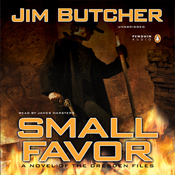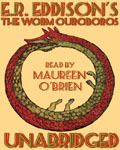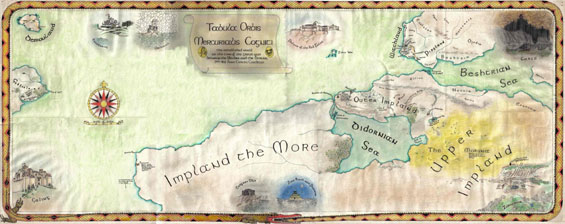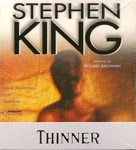
 Small Favor
Small Favor
By: Jim Butcher Read by James Marsters
Book 10 of The Dresden Files
Audible Download – 13 Hours 50 Mins [UNABRIDGED]
Publisher: Audible / Buzzy Multimedia
ISBN-10: 0143143395
ISBN-13: 978-0143143390
Themes: / Fantasy / Mystery / Magic / Private Detective / Wizard / Noir /
No one’s tried to kill Harry Dresden for almost an entire year, and his life finally seems to be calming down. For once, the future looks fairly bright. But the past casts one hell of a long shadow. An old bargain has placed Harry in debt to Mab, monarch of the Winter Court of the Sidhe, the Queen of Air and Darkness-and she’s calling in her marker. It’s a small favor he can’t refuse…one that will trap Harry Dresden between a nightmarish foe and an equally deadly ally, and one that will strain his skills-and loyalties-to their very limits. It figures. Everything was going too well to last…
Before I start let me say that I am HUGE fan of the Dresden series having read all the paperbacks and watched the failed television series. That being said Buzzy Multimedia and James Marsters actually manage to improve the book each time they release their audibook version of a Dresden novel and in my opinion Small Favor is their best effort yet.
The 10th Book in the Series opens with Harry enjoying a peaceful moment with his friends that soon comes to an end when he is reminded in a very Dresden-esque way that he has a debt to repay and the favor is being cashed in. Harry is quickly thrust into a situation full of plot twists that has him squaring off against evil faries, demon possessed people, and in the middle of the largest supernatural power grab ever. Whats worse is he is tasked with saving a crime lord who he has grudgingly partnered with in the past.
The “Small Favor” referenced in the title is a debt owed to an evil fairy who in the opening of the book has Harry’s back pressed literally up against a wall. Faced with angering Mab, fighting off a fairy Hit Squad looking for blood, and an angry Detective Murphy; Dresden wisely shuts up and commits to the favor. What unfolds is an amazing ride with a decisive battle for the future of mankind being waged and Harry is in the middle of it and like most of the other books in the Dresden series Small Favor focuses on this conflict and the difference that one intuitive magic wielding detective can make.
One part Sam Spade two parts Merlin that is the recipe for Harry Dresden a detective able to put the pieces together and is not afraid to charge in staff blazing. As with Jim Butcher’s other novels in the series Harry is able to follow clues that others would miss and often times it leads him the right direction, if not a moment or too late. Intuition aside the thing I like best about Harry is his ability to face overwhelming odds with a well placed quip. Small Favor is also a bit of reunion of sorts with some of the most notable characters from the series making an appearance; Johnny Marcone, Hendrix, Kincaid, Ivy, The Denarians, Lucio, Michael and the other Knights, Thomas, Murphy, and even mouse.
With epic battle scenes and rich attention to detail; the world of Chicago comes alive and it is hard not wonder if there are indeed evil fey, demons, and holy sword wielding knights waging war in the streets. One of the best things about the book and the series in general is the perspective the story takes. Written as narrative it feels more like recounting of past events rather than a piece of fantasy. This perspective combined with the masterful reading of James Marsters makes this an incredibly enjoyable book and even better audiobook.
When Buzzy Multimedia selected James Marsters to read the book they must have held a casting call or something because he has the perfect voice. He absolutely embodies Harry Dresden furthermore James Marsters doesn’t just read the story he acts it out. For instance when it says in the book that Harry roared out FUEGO James Marsters actually does just bellowing it like he was hurling a fireball at an evil Fairy or Demon.
Attention to detail is apparant throughout the book and there do not seem be any errors in recording, mispronunciations, stumbling over words or anything to disturb the listening. In addition to the excellent production quality the audio levels were very clear and even throughout and when James Marster’s got loud there was no crackle in the speakers.
The worst thing about this book is that is comes to an end. As I said in the begining I am a huge fan of the Dresden series and while I believe that the first-time reader could start with Small Favor and enjoy it thoroughly. It is probably best if the first time reader begins with the first book as there are details about each of the major character’s explained throughout the series. That said if you are a fan of the Dresden Files series pick up Small Favor if you are not yet acquainted with the series do yourself a “small favor” and start at the begining with Storm Front.
Posted by Mark Flavin
 Od Magic
Od Magic




